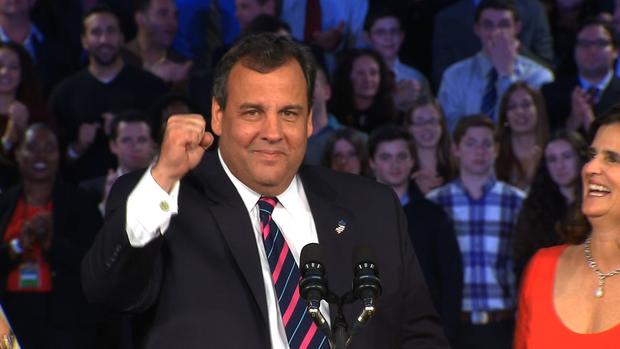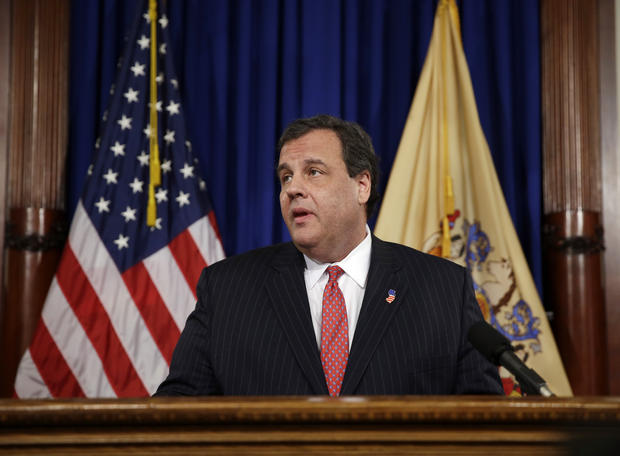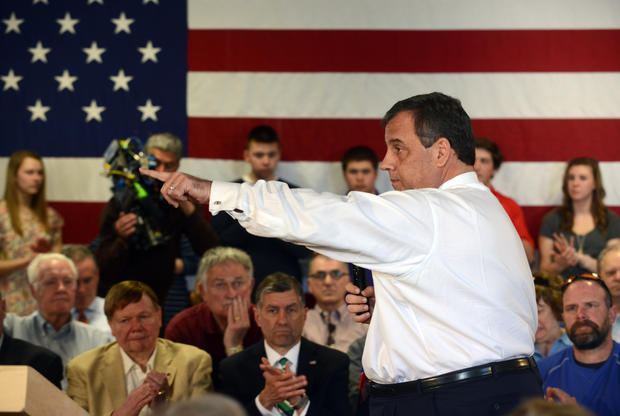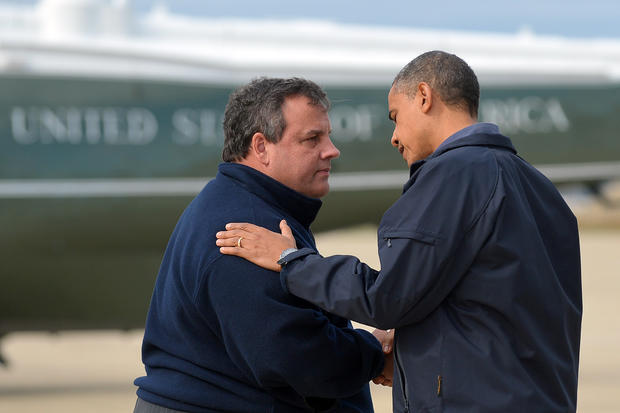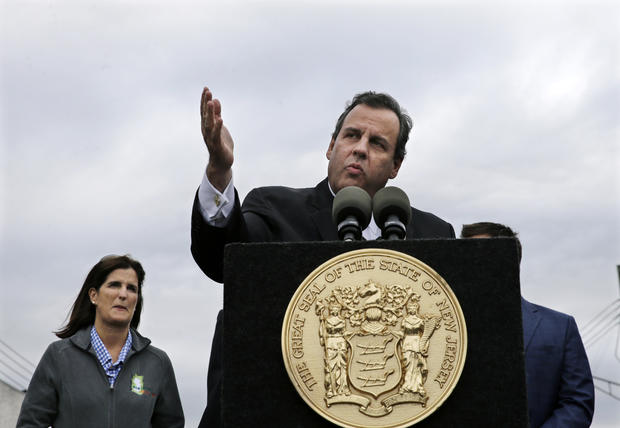Five things to know about Chris Christie
By Taeler De Haes and Jake Miller
New Jersey Gov. Chris Christie will declare his presidential candidacy on Tuesday, joining the 13 Republican candidates who have already fixed their sights on the White House in 2016.
He enters the race as an underdog. A Monmouth University poll released earlier this month ranked him at just four percent among GOP primary voters nationwide, trailing top-tier contenders like Florida Gov. Jeb Bush, Wisconsin Gov. Scott Walker, and Florida Sen. Marco Rubio, among others.
It wasn't supposed to be this way. Christie was initially considered a rock-solid prospect for Republicans in 2016, possibly even an early frontrunner, in the aftermath of the GOP's 2012 defeat. But a combination of local scandals, sagging approval ratings, and stronger-than-expected Republican rivals have taken the wind out of his sails.
But Christie excels at retail politics and has a solid record of conservative accomplishment in staunchly Democratic New Jersey, so it would be a mistake to count him out at this early stage. His campaign is now focused on a few key early states, particularly New Hampshire.
"He will do very well in the initial debates and that combined with his retail political skills, I think there's a clear path for him," a Christie fundraiser told CBS News. "We still have a very long time before the first primaries and he has an opportunity to clearly define himself in the field. There is no frontrunner, and anything can happen."
A source close to the campaign told CBS News that Christie's launch rally on Tuesday will "have the feel of a town hall," and that the governor, will speak without prepared remarks, which is unusual - if not unique - in the race so far.
"He'll frame his record as a Republican governor in a blue state, where a lot of people said it would be impossible to take on issues such as tenure reform and criminal justice reform," the source said. "He'll highlight his record of not raising taxes and cutting spending... and he'll frame his record in that context. When people told him, 'You can't do what you want to do,' that was a premise he can't accept."
Here are five things to know about Chris Christie.
He was once considered a frontrunner
Some of the Republican Party's most influential donors waged a concerted behind-the-scenes effort to lure Christie into the 2012 race, but they were unable to persuade him. After former Massachusetts Gov. Mitt Romney, the 2012 GOP nominee, lost the election, some conservatives were already pitching Christie as the GOP's best shot in 2016.
"He is, by far, far and away, the frontrunner right now," influential conservative columnist Charles Krauthammer told Newsmax shortly after the 2012 election. "If you had to put your money in Vegas, the shortest odds would be on Christie winning the nomination...There are areas where conservatives will disagree with him, but if you find a guy who wins by 22 points in a deeply, deeply Democratic state, you've got to take a look at him."
A resounding reelection victory in 2013 - Christie won with more than 60 percent of the vote - only cemented his reputation as the Republican to watch in 2016.
Some Republicans saw in Christie proof that you could govern as a conservative while still appealing to the middle of the electorate. He took on fractious issues like education reform and spending cuts, he sold his agenda aggressively, and he lived to fight another day.
It seemed like a solid launching pad for a Republican presidential bid. But at least one person was convinced it was too early to handicap the 2016 race: Christie himself.
"It's December of 2013," he said at a news conference after his reelection, when asked about those who named him an early GOP frontrunner in 2016. "It's completely meaningless."
Bridgegate put a big dent in his armor
Since his reelection, Christie's approval ratings have sunk to some of their lowest-ever levels in New Jersey - a Fairleigh Dickinson poll released earlier this month, for example, found that only 30 percent of the state's voters approve of the job he's doing.
And while it would be a mistake to blame his sagging poll numbers on one factor alone, there's no denying that the scandal known as "bridgegate" has taken quite a toll.
A controversy that erupted after it was revealed in early 2014 that several of Christie's former allies engineered a traffic jam on the George Washington Bridge in September 2013 to punish a local Democratic mayor who declined to endorse the governor's reelection bid.
When the scheme was exposed, Christie fired the aides who were involved and forced the resignation of David Wildstein, the man he'd appointed to run the Port Authority, which regulates traffic on the bridge.
A number of investigations were launched by federal authorities and by the New Jersey legislature, and several people involved in the scheme have been indicted. But Christie has insisted all along that he was not aware of the scheme until he read about it in the news. To date, no information contradicting that claim has surfaced.
But there's no denying Bridgegate undermined Christie's presidential aspirations - it soured some New Jersey voters on Christie's leadership style, and it tarnished his national reputation as a Republican with mass-market appeal.
"People used to talk about Gov. Christopher Christie's appeal to independent voters, but many of those voters now have second thoughts," explained Maurice Carroll, assistant director of the Quinnipiac University polling institute, in 2014. "Bridgegate has faded from the headlines, but Gov. Christie still hasn't recovered."
His path to victory runs through New Hampshire
Despite some recent bumps in the road, Christie can take heart in the example of another Republican who weathered a near-death experience on the presidential campaign trail and ultimately emerged the winner of the GOP primary.
In the summer of 2007, Arizona Sen. John McCain's presidential bid was in bad shape - his fundraising had all but collapsed, some of his staffers were departing, and speculation that he might soon throw in the towel began mounting.
It was an ignominious fall from grace for McCain, who began his 2008 bid as the party's heir apparent thanks to his second-place finish in the 2000 GOP race. But the maverick soldiered on, pinning his hopes on New Hampshire and straight-talking his way through dozens of town halls in the state.
The efforts paid off: McCain's victory in the 2008 New Hampshire primary catapulted him back into contention, and he went on to win the GOP nomination later that year.
Christie is hoping he can replicate that feat this year, and in some ways, he's well-positioned to do just that. As the governor of a northeastern state, he has some regional appeal that could serve him well among New Hampshire voters. He's the kind of center-right figure who's excelled in the state in recent cycles. And he's very familiar with the town hall give-and-take that can be so critical to a candidate's success in New Hampshire.
Thus far this year, Christie has made far more visits to New Hampshire than Iowa. During one visit in April, Christie said voters can expect to see him at more town halls in the future.
"If I do run for president, that's exactly what I'll do as often as I can right here in New Hampshire, because there's no place, as you know, there's no place that takes it any more seriously, the picking of a president, than New Hampshire," he said.
He's not wasting any time, either - after he declares his bid in Livingston, New Jersey on Tuesday, he'll head to a town hall event in New Hampshire later that day.
He faced criticism for being too close to Obama
After Hurricane Sandy struck New York and New Jersey shortly before the 2012 election, President Obama flew to the area to visit some of the areas hit hardest by the storm. He was accompanied on his tour by Christie, who greeted him warmly on the tarmac and offered fairly effusive praise for the president's response to the storm.
"The cooperation has been great with FEMA here on the ground and the cooperation from the president of the United States has been outstanding," Christie told CBS This Morning in the wake of the storm. "He deserves great credit."
Some critics within the GOP thought Christie was too warm in his embrace of Mr. Obama, giving the president a prime opportunity to look like a leader -- and a bipartisan photo-op to boot. As one of Romney's advisors complained to the New York Times, "Christie...allowed Obama to be president, not a politician."
Several months after the incident, Christie was snubbed by the organizers of the Conservative Political Action Conference (CPAC), who declined to invite him to their 2013 gala. One CPAC insider told the National Review the conference was focused on "the future of conservatism," and Christie didn't fit the bill. (The New Jersey governor did appear at CPAC in 2014 and 2015.)
Speaking with Fox News shortly after Sandy hit, Christie made it clear the disaster in New Jersey at the time was more important than the impending election: "If you think right now I give a damn about presidential politics, then you don't know me."
And some in the GOP were more understanding about Christie's decision to appear with the president. "I don't see how anyone could blame a governor of a devastated state for working with the sitting president to help his people," longtime New Jersey Republican strategist Roger Bodman said in an interview with CBS News in 2012. "If anyone wants to kick him in the political tail for doing that, he'd say, 'Screw you.'"
He’s the “sit down and shut up” candidate
In dozens of town hall meetings and on his weekly "Ask the Governor" radio show, Christie has faced countless questions from New Jersey voters. Some questioners approach him constructively, but others are more inclined to fight with the governor than ask him a question.
Christie, to put it mildly, has developed a reputation for fighting back.
Time and again, the governor has showcased a pugnacious, bombastic style of retail politics - he doesn't shy away from a good shouting match. He relishes it. To his fans, he's a profile in candor and an open book. To his detractors, he's a bully.
One of Christie's more heated sparring matches came in October 2014. During a speech in Belmar, New Jersey on the two year anniversary of Hurricane Sandy, a man bearing a sign that read, "Get Sandy families back in their home - finish the job" began accosting the governor.
After some contentious back-and-forth between the governor and the heckler, Christie pointedly ended the dialogue: "So listen, you want to have the conversation later, I'm happy to have it, buddy. But until that time, sit down and shut up."
During a question-and-answer at CPAC in March of this year, conservative talk show host Laura Ingraham pressed Christie on some of his snappier remarks.
"What my parents taught me was that, if you really care about something, then you need to go all in. This is not about half-measures," Christie said.
"Yeah, but 'sit down and shut up'?" Ingraham asked.
"Yeah, well, sometimes people need to be told to sit down and shut up," Christie said, drawing laughs and applause from the conservative activists in the room. "Some more of that stuff should be happening in Washington, D.C. because there's so much ridiculous stuff being spewed, especially out of the White House. Someone should say it's time to shut up."
As Christie prepares to jump into the 2016 fray, it's clear he plans to campaign on his reputation as a straight-talker. The slogan on his new campaign website is "Telling it Like it is." In a video on the site, Christie discusses his Italian and Irish roots, recalling some words of advice from his late mother.
"I get accused a lot of times of being too blunt and too direct and saying what's on my mind just a little too loudly," he said. "I know if my mom were still alive, she would say to me, 'I taught you, that in a trusting relationship, you don't hold anything back.'"
